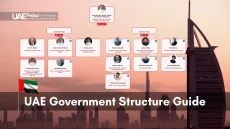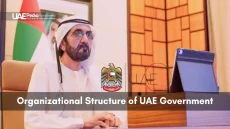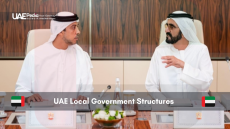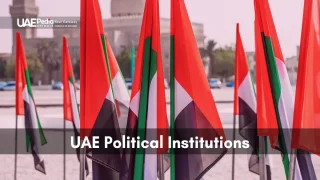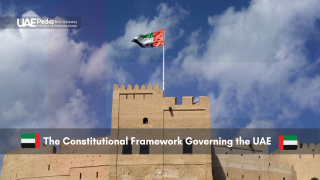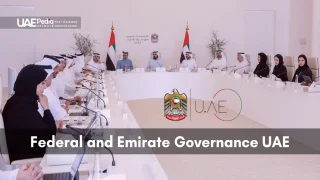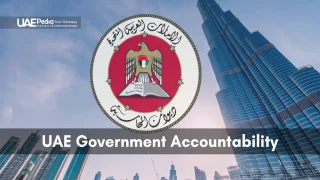The UAE’s government policies shape its future. With 11 million people and a $509 billion economy, it’s a big task. The UAE has a strong plan to make its vision real.
Implementing Government, It focuses on new tech like AI and keeps data safe. Did you know AI could add $96 billion to the UAE’s economy by 2030? That’s 13.6% of its GDP.
UAE’s Constitutional Framework and Political Structure
The UAE Government has a special setup. It’s a federation of seven Emirates. The Constitution, with 152 articles, guides how the country works.
The Federal System and Seven Emirates
The UAE is made up of seven monarchies. These are Abu Dhabi, Dubai, Sharjah, Ajman, Fujairah, Ras al-Khaimah, and Umm al-Quwain. Each has its own power and gets to keep some money.
| Emirate | Ruler | Federal Position |
|---|---|---|
| Abu Dhabi | Mohamed bin Zayed Al Nahyan | President of UAE |
| Dubai | Mohammed bin Rashid Al Maktoum | Prime Minister of UAE |
Constitutional Rights and Governance
The UAE Constitution protects basic rights. It also sets up how the country is run. This way, the country and Emirates work together but also have their own freedom.
Role of Federal National Council
The Federal National Council (FNC) is very important. It has 40 members, with 20 elected and 20 chosen by rulers. The FNC helps make laws and gets people involved in government.
The UAE is always changing to make things better. It wants to bring the Emirates together while still respecting their differences.
UAE Government Policy Implementation
The UAE’s policy making is thorough and always changing. The government has many ways to carry out its plans. These include Federal Laws, Decrees by Law, and Cabinet Resolutions, making a strong law base.
Legislative Framework and Policy Tools
The UAE Constitution is the base for making policies. Federal Laws are key for following the Constitution. Decrees by Law are used for quick laws between Supreme Council meetings.
The President makes Federal Decrees with Cabinet approval.
Federal Laws and Implementation Process
Putting Federal Laws into action takes several steps. The Cabinet makes rules to help follow laws. Ministries and federal bodies then make decisions to carry out these laws.
Role of Ministries and Government Entities
Ministries are very important in policy making. They make sure laws are followed in their areas. The UAE Soft Power Council helps the country’s image and works with both public and private sectors.
Monitoring and Evaluation Systems
The UAE government checks its policies well. It looks at how well goals are met, like:
- Doubling GDP from AED 1.49 trillion to AED 3 trillion
- Generating AED 800 billion in non-oil exports
- Raising the tourism sector’s contribution to GDP to AED 450 billion
- Increasing foreign trade value to AED 4 trillion
The Government Strategy 2022-2026 is ready for the “We the UAE 2031” vision. It aims to double speed and efforts. It focuses on key goals and big projects for quick results.
Read more: Decision-Making Processes Within the UAE Government
The UAE has a strong plan for its government policies. It uses a special system to help grow and innovate. This system helps the country in many ways, like making food and keeping the environment clean.
But, the UAE still faces some big challenges. For example, managing waste and recycling is hard. The country imports most of its food, which is over 90%. This has led to creative solutions, like a farm in Dubai that grows lots of greens using very little water.
The UAE wants to be a leader in being green. It has programs and investments in clean energy. The country is also working on farming in a way that’s good for the planet. This helps with food security, even though it imports a lot of food.
The UAE will keep changing and updating its plans. It uses a good system and new ideas to tackle big problems. This way, the UAE can stay strong and important on the world stage.




